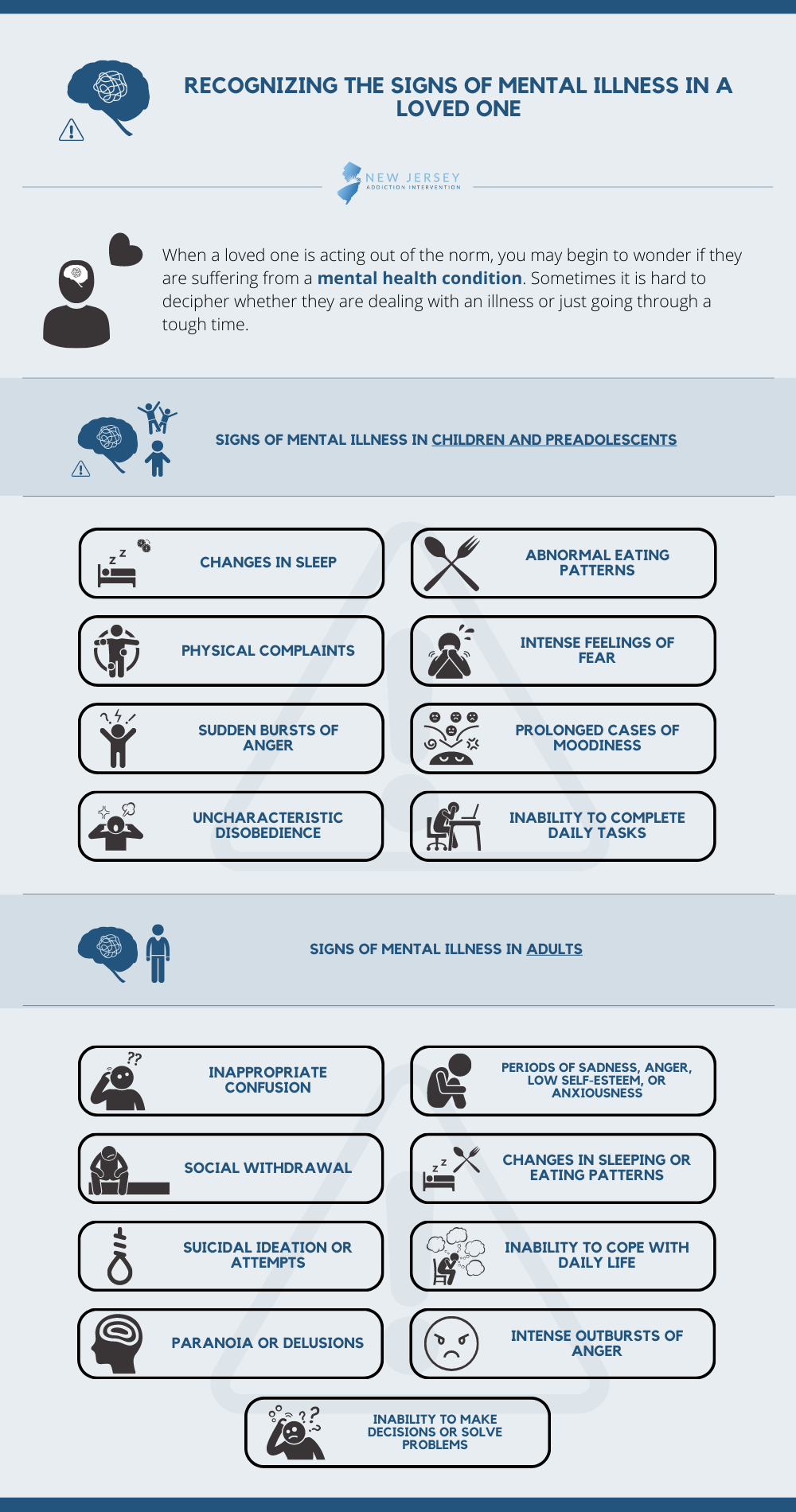Mental health has become a common topic of interest in recent years, thanks to several campaigns, celebrity efforts, and influencers on social media who are working to raise awareness. People are beginning to talk about conditions such as depression, anxiety disorders, self-destructive behaviors, and personality disorders. While this has allowed for a lot of societal progress regarding accepting mental health conditions as real issues, individuals still struggle with symptoms daily.
Unfortunately, many people in America struggle with mental illness without professional help. Depending on the disorder, 30 to 80% of individuals with a mental health condition do not receive treatment.[1] Oftentimes, individuals who do not receive treatment experience a worsening of symptoms over time. This leads to an inability to function in one’s daily life, causing financial, social, emotional, physical, and even familial issues.
When a loved one is struggling with an untreated mental health condition, it is common for the family to begin to experience issues of their own. For example, this may lead to loss of sleep, high levels of stress, and even feelings of guilt and shame. This may lead the individual’s family to wonder what they can do to help. Thankfully, families of mentally ill loved ones can conduct a mental health intervention.
Recognizing the Signs of Mental Illness in a Loved One

When a loved one is acting out of the norm, you may begin to wonder if they are suffering from a mental health condition. Sometimes it is hard to decipher whether they are dealing with an illness or just going through a tough time. While each condition has its own set of symptoms, there are broad signs of mental illness that you can recognize.
Signs of mental illness in children and preadolescents:[2]
- Changes in sleep
- Abnormal eating patterns
- Physical complaints
- Intense feelings of fear
- Sudden bursts of anger
- Prolonged cases of moodiness
- Uncharacteristic disobedience
- Inability to complete daily tasks
Signs of mental illness in adults:
- Inappropriate confusion
- Periods of sadness, anger, low self-esteem, or anxiousness
- Social withdrawal
- Changes in sleeping or eating patterns
- Suicidal ideation or attempts
- Inability to cope with daily life
- Paranoia or delusions
- Intense outbursts of anger
- Inability to make decisions or solve problems
If your loved one is displaying any of the aforementioned signs, they may be suffering from a mental health condition.
Types of Mental Health Interventions
If you are considering hosting an intervention for your loved one’s mental health, it is important to be aware of the two types of interventions.
Crisis Interventions
Crisis interventions are intended for individuals who are in the middle of an episode.[3] For example, this type of intervention is beneficial if an individual with schizophrenia is experiencing catatonic-like behaviors or severe delusions. Another example could be a clinically depressed individual who is experiencing symptoms of suicidal ideation, such as talking about dying, giving away their personal belongings, or writing out suicide notes.
Typical interventions include a sit down with family members and friends of the individual. The participants would discuss with their loved one how their mental health issues have affected them. However, this would only worsen the problem for an individual in a crisis-level episode.
In general, crisis interventions are conducted by professionals that specialize in quickly transitioning the individual to intensive treatment to avoid furthering their suffering. This form of mental health intervention is a de-escalation tactic and works to prevent hospitalization.
Interventions for Worsening Conditions
The vast majority of mental health conditions do not include episodes of delusions or crisis-like events. Most individuals with a mental health condition experience emotional distress, issues with work or school, and disinterest in social or family activities. This may present as the loss of jobs, worsening communication with family and friends, or an inability to take care of oneself. Additionally, some individuals may present as high-functioning, meaning their symptoms are harder to notice than others.
For individuals with worsening conditions, family members should utilize a traditional form of intervention hosted by a professional. This means that the family members and friends of the loved one will gather together to discuss the loved one’s symptoms under the supervision of a professional interventionist. Then, they will emotionally appeal to the individual to get them into treatment.
How to Plan a Mental Health Intervention
Interventions have been dramatized in television shows and movies for years. Because of this, many families may attempt to conduct a mental health intervention for a struggling loved one on their own. While they are doing this with good intentions, this is a dangerous practice. Mental health interventions must be planned with a professional interventionist who can help make sure the intervention goes smoothly.
When an intervention is meticulously planned, it tends to provide better outcomes for everyone involved. Because emotions tend to run high when mental health is being discussed, saying the wrong thing could completely derail an intervention. As a result, professional interventionists will help family members and friends write scripts to use during the intervention. The most important aspect is to set a positive and supportive tone, preventing the individual from becoming defensive or from feeling attacked.
Lastly, professional interventionists will help the family plan for their loved one to attend professional mental health treatment. This will include the start date of treatment, how long they will attend treatment, where they will go, and whether it will be residential or outpatient. By planning this ahead of time, you will take away the individual’s stress related to planning and obtaining a spot in a mental health treatment program.
Get Help Planning a Mental Health Intervention With New Jersey Interventions
If your loved one struggles with a mental health condition and will not attend treatment on their own, it may be time to consider an intervention. At New Jersey Interventions, our professional interventionists help families plan interventions and find suitable mental health treatment facilities for their loved one to attend. Contact us today for more information on how to plan a mental health intervention for a struggling loved one.
References:
Medically Reviewed: September 7, 2021

All of the information on this page has been reviewed and verified by a certified addiction professional.

